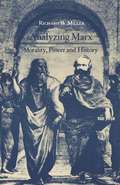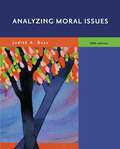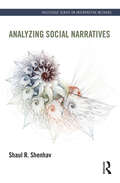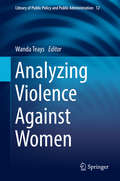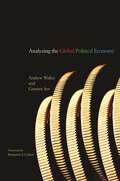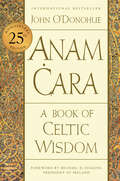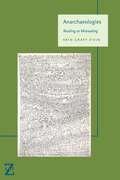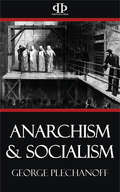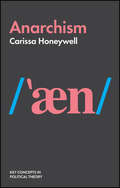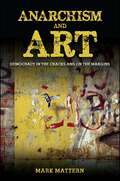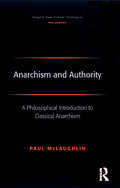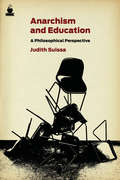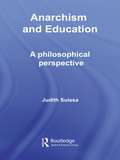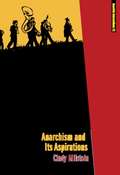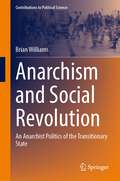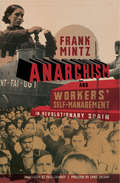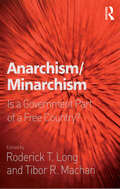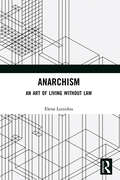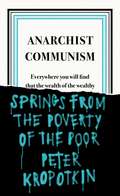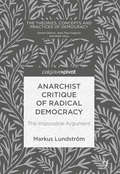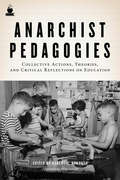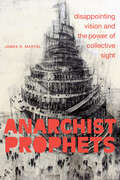- Table View
- List View
Analyzing Marx: Morality, Power and History
by Richard W. MillerIn this book Marx is revealed as a powerful contributor to the debates that now dominate philosophy and political theory. Using the techniques of analytic philosophy to unite Marx's general statements with his practice as historian and activist, Richard W. Miller derives important arguments about the rational basis of morality, the nature of power, and the logic of testing and explanation. The book also makes Marx's theory of change useful for current social science, by replacing economic determinist readings with a new interpretation in which systems of power relations are the basis of change. Part One discusses Marx's criticisms of the moral point of view as a basis for social choice. The outlook that emerges is humane but antimoral. Part Two argues that Marx's concept of the ruling class is a means, of measuring political power that is ignored yet urgently needed by present-day social science. Part Three bases Marx's theory of history on the dynamics of power, challenging both the standard, economic determinist readings of the theory and standard conceptions of science.
Analyzing Moral Issues (5th edition)
by Judith A. BossThis text with readings addresses a variety of timely and interesting moral issues, providing background information and primary source selections for each issue presented. It includes a chapter on ethical theory and covers a broad range of ethical perspectives--among them virtue ethics (Aristotelian and Confucian), Buddhist and feminist care ethics, and the Rawlsian and communitarian approaches. The fifth edition also includes new readings and case studies covering some of the more pressing issues of recent ethical debate, such as genetic enhancement of children, racism and sexism in the 2008 presidential elections, the effect of the U. S. Patriot Act on academic freedom, military conscription, and global warming.
Analyzing Social Narratives (Routledge Series on Interpretive Methods)
by Shaul R. ShenhavInterpreting human stories, whether those told by individuals, groups, organizations, nations, or even civilizations, opens a wide scope of research options for understanding how people construct, shape, and reshape their perceptions, identities, and beliefs. Such narrative research is a rapidly growing field in the social sciences, as well as in the societally oriented humanities, such as cultural studies. This methodologically framed book offers conceptual directions for the study of social narrative, guiding readers through the means of narrative research and raising important ethical and value-related dilemmas. Shenhav details three classic elements of narrative—text, story, and narration—familiar concepts to those in literary studies. To the classic trilolgy of terms, this book also adds multiplicity, a crucial element for applying narrative analysis to the social sciences as it rests on the understanding that social narratives seek reproduction and self-multiplicity in order to become "social" and influential. The aim of this book is to create an easy, clear, and welcoming introduction to narratology as a mode of analysis, especially designed for students of the social sciences to provide the basics of a narratological approach, and to help make research and writing in this tradition more systematic. .
Analyzing Violence Against Women (Library of Public Policy and Public Administration #12)
by Wanda TeaysThis timely anthology brings into sharp relief the extent of violence against women. Its range is global and far reaching in terms of the number of victims. There are deeply entrenched values that need to be rooted out and laid bare.This text offers a philosophical analysis of the problem, with important insights from the various contributors. Topics range from sexual assault to media violence, prostitution and pornography, domestic violence, and sexual harassment. Each of the four parts include essays which tackle these issues and provide us with tools for bringing about change.The philosophical approaches to the topic give readers insight into the harms of interpersonal violence and its impact on the lives of its victims. Analyzing Violence Against Women calls us to examine public policies and work for systemic change. In the process, we are reminded that the concerns of the discipline of Philosophy encompasses issues with a wider scope.Students will especially benefit from seeing how the various authors grapple with this pressing issue and clarify why we need to bring about change.
Analyzing the Global Political Economy
by Andrew Walter Gautam SenIdeally suited to upper-undergraduate and graduate students, Analyzing the Global Political Economy critically assesses the convergence between IPE, comparative political economy, and economics. Andrew Walter and Gautam Sen show that a careful engagement with economics is essential for understanding both contemporary IPE and for analyzing the global political economy. The authors also argue that the deployment of more advanced economic theories should not detract from the continuing importance for IPE of key concepts from political science and international relations. IPE students with little or no background in economics will therefore find this book useful, and economics students interested in political economy will be alerted to the comparative strengths of political science and other social science disciplines. A concise look at the foundations of analysis in the political economy of global trade, money, finance, and investment Suitable for upper-undergraduate and graduate students with some or no economic background Techniques and findings from a range of academic disciplines, including international relations, political science, economics, sociology, and history Further reading and useful weblinks including a range of relevant data sources, listed in each chapter
Anam Cara [Twenty-fifth Anniversary Edition]: A Book of Celtic Wisdom
by John O'Donohue“In this twenty-fifth anniversary edition, you will find John a “soul friend” on your own journey through life, offering support and solace, clarity, and consciousness—expanding narratives that invite you to experience relationships with people, nature, and even your inner world in new ways that nurture well-being and resilience in these challenging times.” —Daniel J. Siegel, MD, Neuropsychiatrist and New York Times Bestselling AuthorA special twenty-fifth anniversary edition of the classic work of Celtic spirituality and mysticism by beloved poet and philosopher, John O'Donohue, with a new introduction by the President of Ireland, Michael D. Higgins, an afterword by the late author’s brother, Pat O'Donohue, and insightful material from O'Donohue's circle of close friends.In this revered classic, John O’Donohue excavates themes of friendship, belonging, solitude, creativity and the imagination, among many others. Widely recognized for bringing Celtic spirituality into modern dialogue, his unique insights from the ancient world speak with urgency for our need to rediscover the thresholds of the soul. With lyrical wisdom and fluency, O'Donohue encourages pathways of discovery to come home to the natural rhythm in ourselves in sacred connection with one another and the landscapes we inhabit. This timeless collection nourishes the heart and elevates the spirit. It is "a book to read and reread forever.” (Irish Times)
Anarchaeologies: Reading as Misreading (Lit Z)
by Erin Graff ZivinHow do we read after the so-called death of literature? If we are to attend to the proclamations that the representational apparatuses of literature and politics are dead, what aesthetic, ethical, and political possibilities remain for us today? Our critical moment, Graff Zivin argues, demands anarchaeological reading: reading for the blind spots, errors, points of opacity or untranslatability in works of philosophy and art.Rather than applying concepts from philosophy in order to understand or elucidate cultural works, the book exposes works of philosophy, literary theory, narrative, poetry, film, and performance art and activism to one another. Working specifically with art, film, and literature from Argentina (Jorge Luis Borges, Juán José Saer, Ricardo Piglia, César Aira, Albertina Carri, the Internacional Errorista), Graff Zivin allows such thinkers as Levinas, Derrida, Badiou, and Rancière to be inflected by Latin American cultural production. Through these acts of interdiscursive and interdisciplinary (or indisciplinary) exposure, such ethical and political concepts as identification and recognition, decision and event, sovereignty and will, are read as constitutively impossible, erroneous. Rather than weakening either ethics or politics, however, the anarchaeological reading these works stage and demand opens up and radicalizes the possibility of justice.
Anarchism & Socialism
by George PlechanoffThe anarchist desire to abolish the State at one blow, and to abolish money, etc., in much the same way, springs from their inability to understand the institutions of capitalist society. To many of them the State is simply the result of people having faith in authority. Give up this belief and the State will cease to exist. It is a myth like God and rests entirely on faith. The anarchist's desire for the abolition of the State arises from entirely different concepts to that of the communists. To these anarchist anti-authoritarians the State is simply bad. It is the most authoritarian thing in sight. It interferes with individual freedom and consequently is the greatest obstruction to "absolute liberty" and other utopian desires of the champions of individualism.
Anarchism (Key Concepts in Political Theory)
by Carissa HoneywellIs it possible to abolish coercion and hierarchy and build a stateless, egalitarian social order based on non-domination? There is one political tradition that answers these questions with a resounding yes: anarchism. In this book, Carissa Honeywell offers an accessible introduction to major anarchist thinkers and principles, from Proudhon to Goldman, non-domination to prefiguration. She helps students understand the nature of anarchism by examining how its core ideas shape important contemporary social movements, thereby demonstrating how anarchist principles are relevant to modern political dilemmas connected to issues of conflict, justice and care. She argues that anarchism can play a central role in tackling our major global problems by helping us rethink the essentially militarist nature of our dominant ideas about human relationships and security. Dynamic, urgent, and engaging, this new introduction to anarchist thought will be of great interest to both students as well as thinkers and activists working to find solutions to the multiple crises of capitalist modernity.
Anarchism and Art: Democracy in the Cracks and on the Margins (SUNY series in New Political Science)
by Mark MatternSituated at the intersection of anarchist and democratic theory, Anarchism and Art focuses on four popular art forms—DIY (Do It Yourself) punk music, poetry slam, graffiti and street art, and flash mobs—found in the cracks between dominant political, economic, and cultural institutions and on the margins of mainstream neoliberal society. Mark Mattern interprets these popular art forms in terms of core anarchist values of autonomy, equality, decentralized and horizontal forms of power, and direct action by common people, who refuse the terms offered them by neoliberalism while creating practical alternatives. As exemplars of central anarchist principles and commitments, such forms of popular art, he argues, prefigure deeper forms of democracy than those experienced by most people in today's liberal democracies. That is, they contain hints of future, more democratic possibilities, while modeling in the present the characteristics of those more democratic possibilities. Providing concrete evidence that progressive change is both desirable and possible, they also point the way forward.
Anarchism and Authority: A Philosophical Introduction to Classical Anarchism
by Paul McLaughlinExamining the political theory of anarchism from a philosophical and historical perspective, Paul McLaughlin relates anarchism to the fundamental ethical and political problem of authority. The book pays particular attention to the authority of the state and the anarchist rejection of all traditional claims made for the legitimacy of state authority, the author both explaining and defending the central tenets of the anarchist critique of the state. The founding works of anarchist thought, by Godwin, Proudhon and Stirner, are explored and anarchism is examined in its historical context, including the influence of such events as the Enlightenment and the French Revolution on anarchist thought. Finally, the major theoretical developments of anarchism from the late-nineteenth century to the present are summarized and evaluated. This book is both a highly readable account of the development of anarchist thinking and a lucid and well-reasoned defence of the anarchist philosophy.
Anarchism and Education: A Philosophical Perspective (Routledge International Studies In The Philosophy Of Education)
by Judith SuissaArguing that the central role of educational practice in anarchist theory and activism has been overlooked by many theorists, this examination of contemporary educational philosophy counters the assertion that anarchism reflects a naïve or overly optimistic view of human nature. By articulating the philosophical underpinnings of anarchist thought on issues of human nature, freedom, authority, and social change, the case is made that the anarchist tradition can be a rich source of insights into perennial philosophical questions about education. This theoretical exploration is then bolstered with a historical account of anarchist education, focusing on key defining features of anarchist schools, their ideological underpinnings, and their pedagogical approaches. Finally, a clear explanation of how anarchist education is distinct from libertarian, progressive, Marxist, and liberal models defines the role of anarchist education in furthering and sustaining a just and equal society.
Anarchism and Education: A Philosophical Perspective (Routledge International Studies in the Philosophy of Education)
by Judith SuissaAlthough there have been a few historical accounts of the anarchist school movement, there has been no systematic work on the philosophical underpinnings of anarchist educational ideas - until now. Anarchism and Education offers a philosophical account of the neglected tradition of anarchist thought on education. Although few anarchist thinkers wrote systematically on education, this analysis is based largely on a reconstruction of the educational thought of anarchist thinkers gleaned from their various ethical, philosophical and popular writings. Primarily drawing on the work of the nineteenth century anarchist theorists such as Bakunin, Kropotkin and Proudhon, the book also covers twentieth century anarchist thinkers such as Noam Chomsky, Paul Goodman, Daniel Guerin and Colin Ward. This original work will interest philosophers of education and educationalist thinkers as well as those with a general interest in anarchism.
Anarchism and Its Aspirations
by Cindy MilsteinFrom nineteenth-century newspaper publishers to the protesters in the "Battle of Seattle" and the recent Greek uprising, anarchists have long been incited to action by the ideal of a "free society of free individuals"-a transformed world in which people and communities relate to each other intentionally and without hierarchy or domination. But what exactly would that look like, and how can we get there?Anarchism and Its Aspirations provides an accessible overview of the history and hopeful future of this vision for a better world. The book quickly brings even the uninitiated reader up to speed with a crash course on some of the most influential anarchists in history and their ideas about how we might achieve the transformation of society. From there, the book looks at how these principles have been put into practice by groups such as the Situationist International, social ecologists, Zapatistas, anti-globalization activists, and other directly democratic organizations and communities in their respective struggles against capitalism and state control.Laying out a clear introduction to some of the main ideas behind an often-misunderstood political philosophy, Anarchism and Its Aspirations helps us imagine the vast possibility of a truly free and democratic society.Cindy Milstein is an activist and educator from Vermont. She serves on the board of the Institute for Anarchist Studies, co-organizes the Renewing the Anarchist Tradition conference, and is a collective member at Black Sheep Books. Her essays have appeared in several anthologies, including Realizing the Impossible, Confronting Capitalism, and Globalize LiberationX.
Anarchism and Social Revolution: An Anarchist Politics of the Transitionary State (Contributions to Political Science)
by Brian WilliamsThis monograph provides an update to anarchist philosophy, advocating for a paradigm shift beyond neoliberalism and liberal democracy. The book’s central thesis has two components. First, it is argued that the maximization of equal liberty requires historical progress beyond the sovereign state system. In contrast to Fukuyama’s (1992) argument that liberal democracy is the end of history, it is argued that liberalism contains two contradictions (socioeconomic inequality and the shortcoming in equal liberty inherent to state power) with the potential to propel history further. This book’s argument – libertarian social democracy – provides a framework to guide that final stage of history. Second, while anarchist philosophy offers a vision beyond the sovereign state, it can be rendered more suitable as an alternative paradigm. Specifically, it is argued that anarchism is hampered by its traditional adherence to prefigurative strategy, according to which the state cannot be used as a means to achieve a free and equal society. By contrast, libertarian social democracy incorporates a role for a democratic transitionary state (described here as gradualist anarchism) thus addressing mainstream “Hobbesian” concerns about bad anarchy (where decentralization yields a net loss in equal liberty). In so doing, the book reveals the full spectrum of anarchist strategy from prefigurative to gradualist.
Anarchism and Workers' Self-Management in Revolutionary Spain
by Paul Sharkey Frank Mintz Chris EalhamThis is the first English translation of Frank Mintz's seminal study of the economic experiments put into place during the Spanish Revolution to both sustain civil society during the war and, more importantly, act as the material basis for a new society. These plans weren't developed by professional economists but grew out of a political movement that put working people at the fore and believed that the collectivized workplace would be the cornerstone of economic life. Includes a prologue by Chris Ealham, author of Anarchism and the City. A retired professor of Spanish, Frank Mintz lives in Paris, France, and is active with the CNT labor union.
Anarchism and Workers' Self-Management in Revolutionary Spain
by Paul Sharkey Frank Mintz Chris EalhamThis is the first English translation of Frank Mintz's seminal study of the economic experiments put into place during the Spanish Revolution to both sustain civil society during the war and, more importantly, act as the material basis for a new society. These plans weren't developed by professional economists but grew out of a political movement that put working people at the fore and believed that the collectivized workplace would be the cornerstone of economic life. Includes a prologue by Chris Ealham, author of Anarchism and the City. A retired professor of Spanish, Frank Mintz lives in Paris, France, and is active with the CNT labor union.
Anarchism/Minarchism: Is a Government Part of a Free Country?
by Roderick T. LongIt is well known that the radical libertarian philosopher Robert Nozick sharply distinguished his vision of the free society from egalitarian liberals such as John Rawls. Less remarked upon is the distinction he drew between the free society governed by a strictly limited government, commonly referred to as 'minarchism', and the society without any government at all - anarchism. In this volume, the editors, Long - an anarchist - and Machan - a minarchist - have brought together a selection of specially commissioned essays from key theorists actively involved in this debate. Each tackles the question of whether or not a government forms a legitimate part of a free society or whether anarchy/minarchy is merely a distinction without a difference.
Anarchism: An Art of Living Without Law
by Elena LoizidouThe term anarchism derives from the Greek word ἀναρχία meaning ‘without ruler or leader, and without law’. Although the roots of the word can be traced back to Ancient Greece, anarchism as a political ideology is relatively new. Anarchism developed as a political ideology at the end of the eighteenth century at the time of the emergence of the modern State. And, as is well known, anarchism developed both a politics and a way of life that did not include the State as its compass, support and structure. In contrast to the extensive contemporary literature about anarchist politics and ideas, this book focuses on the practices and attitudes that constitute what the author refers to as an anarchist ‘art of life’. The book draws on archival material that records the life and actions of the anarchist Emma Goldman and her associates, legal documents and writings by classical (Pierre Joseph Proudhon, Peter Krotopkin) and contemporary anarchists (David Graeber, Saul Newman, Ciarra Bottici), as well as contemporary groups such as the Clandestine Insurgent Rebel Clown Army and Occupy Wall Street. By studying the idiosyncrasies of this art of life, it argues, we are better able to appreciate how anarchism is not some future utopian oriented project, waiting to come into existence after a revolution, but rather exists in parallel to the life and politics offered by the State. Anarchism: An Art of Living Without Law will be of interest to graduate students and academics working on critical legal theory, political theory, sociology and cultural studies.
Anarchist Communism: Three Essays (Penguin Great Ideas)
by Peter Kropotkin'Everywhere you will find that the wealth of the wealthy springs from the poverty of the poor'Fuelled by anger at injustice and optimism about humankind's ability to make a better, truly communal society, the anarchist writings of Peter Kropotkin have influenced radicals the world over, from nineteenth-century workers to today's activists.One of twenty new books in the bestselling Penguin Great Ideas series. This new selection showcases a diverse list of thinkers who have helped shape our world today, from anarchists to stoics, feminists to prophets, satirists to Zen Buddhists.
Anarchist Critique of Radical Democracy: The Impossible Argument (The Theories, Concepts and Practices of Democracy)
by Markus LundströmThis book addresses the conflictual nature of radical democracy. By analyzing democratic conflict in Husby, a marginalized Stockholm city district, it exposes democracy’s core division – between governors and governed – as theorized by Jacques Rancière. Tracing the genealogy of that critique, the book interrogates a historical tradition generically adverse to every form of governance, namely anarchism. By outlining the divergent and discontinuous relationship between democracy and anarchy – within the history of anarchist thought – the author adds to democratic theory ‘The Impossible Argument’: a compound anarchist critique of radical democracy.
Anarchist Pedagogies: Collective Actions, Theories, and Critical Reflections on Education
by Allan AntliffImportant and challenging issues in the area of anarchism and education are presented in this history of egalitarian and free-school practices. From Francisco Ferrer's modern schools in Spain and the Work People's College in the United States, to contemporary actions in developing "free skools" in the United Kingdom and Canada, the contributors illustrate the importance of developing complex connections between educational theories and collective actions. Major themes in the volume include learning from historical anarchist experiments in education, ways that contemporary anarchists create dynamic and situated learning spaces, and critical reflections on theoretical frameworks and educational practices. Many trailblazing thinkers and practitioners contributed to this volume, such as Jeffery Shantz, John Jordon, Abraham de Leon, Richard Kahn, Matthew Weinstein, and Alex Khasnabish. This thoughtful and provocative collection proves that egalitarian education is possible at all ages and levels.
Anarchist Prophets: Disappointing Vision and the Power of Collective Sight
by James R. MartelIn Anarchist Prophets James R. Martel juxtaposes anarchism with what he calls archism in order to theorize the potential for a radical democratic politics. He shows how archism—a centralized and hierarchical political form that is a secularization of ancient Greek and Hebrew prophetic traditions—dominates contemporary politics through a prophet’s promises of peace and prosperity or the threat of violence. Archism is met by anarchism, in which a community shares a collective form of judgment and vision. Martel focuses on the figure of the anarchist prophet, who leads efforts to regain the authority for the community that archism has stolen. The goal of anarchist prophets is to render themselves obsolete and to cede power back to the collective so as to not become archist themselves. Martel locates anarchist prophets in a range of philosophical, literary, and historical examples, from Hobbes and Nietzsche to Mary Shelley and Octavia Butler to Kurdish resistance in Syria and the Spanish Revolution. In so doing, Martel highlights how anarchist forms of collective vision and action can provide the means to overthrow archist authority.
Anarchy Unbound
by Peter T. LeesonIn Anarchy Unbound, Peter T. Leeson uses rational choice theory to explore the benefits of self-governance. Relying on experience from the past and present, Professor Leeson provides evidence of anarchy "working" where it is least expected to do so and explains how this is possible. Provocatively, Leeson argues that in some cases anarchy may even outperform government as a system of social organization, and demonstrates where this may occur. Anarchy Unbound challenges the conventional self-governance wisdom. It showcases the incredible ingenuity of private individuals to secure social cooperation without government and how their surprising means of doing so can be superior to reliance on the state.
Anarchy and Legal Order
by Gary ChartierThis book elaborates and defends the idea of law without the state. Animated by a vision of peaceful, voluntary cooperation as a social ideal and building on a careful account of non-aggression, it features a clear explanation of why the state is illegitimate, dangerous, and unnecessary. It proposes an understanding of how law enforcement in a stateless society could be legitimate and what the optimal substance of law without the state might be, suggests ways in which a stateless legal order could foster the growth of a culture of freedom, and situates the project it elaborates in relation to leftist, anti-capitalist, and socialist traditions.
